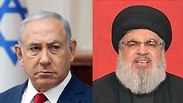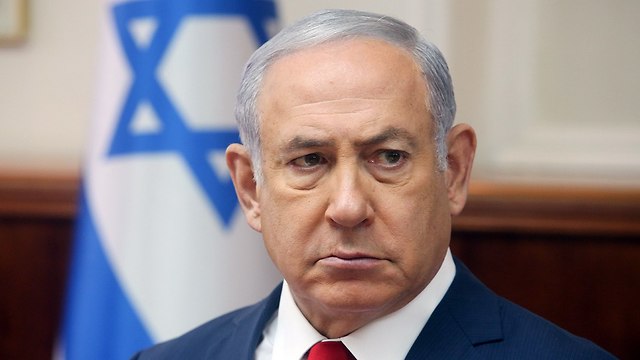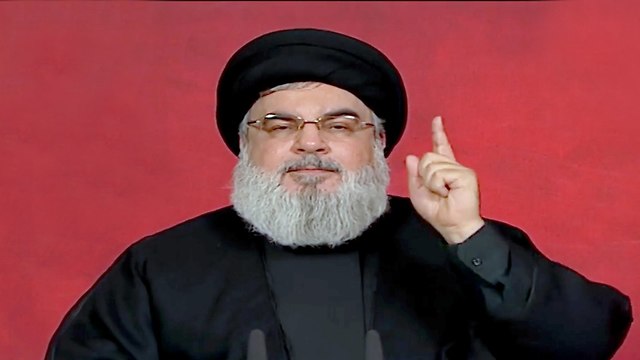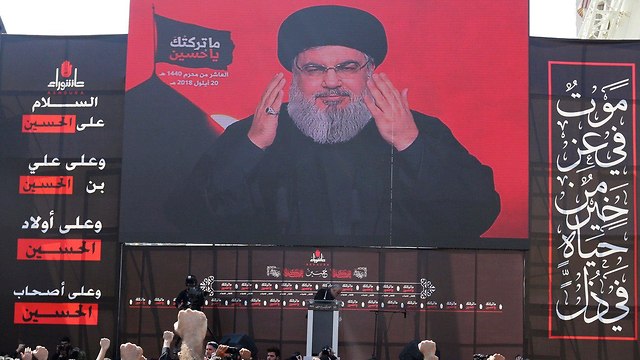

PM threatens Hezbollah with devastating retaliation if Israel is attacked
Following Hassan Nasrallah’s speech where he claimed to have acquired 'highly accurate' missiles, Netanyahu warns Israeli response to Lebanon terror group's aggression will be on an 'unimaginable' scale; prime minister also stresses importance of security cooperation with Russia following downing of plane.
Prime Minister Benjamin Netanyahu responded on Tuesday to Hezbollah's Secretary-General Hassan Nasrallah’s threats, warning that a devastating Israeli retaliation would follow if the terror group decides to launch an attack on Israeli territory.
"If they confront us, they will suffer a crushing blow the levels of which they cannot imagine," exclaimed the prime minister during an event at the Prime Minister's Office.
Netanyahu’s statement comes as a response to the Hezbollah leader’s remarks, made earlier in the day, boasting that the group possesses “highly accurate” missiles despite Israeli attempts to prevent it from acquiring such weapons.
"I heard the arrogant words that came from the Hezbollah chief. This comes from the same man who said after 2006 that if he had known what Israel's response would be to the abduction of three of our soldiers, he would have thought twice about doing it," Netanyahu vented.
The prime minister also addressed the downing of a Russian plane, which was initially attributed to the IDF.
"Regarding our relations with Russia, I spoke with President Putin on the eve of Yom Kippur, and expressed regret for the loss of 15 Russian air crew members, whose plane was shot down by the Syrian army,” stressed Netanyahu.
“This is Iran's attempt to use Syrian territory to launch attacks on Israel and to arm our enemies such as Hezbollah,” the prime minister went on to say before adding that he emphasized to the Russian president that Israel has “the right to self defense.”
Netanyahu then underlined the importance of preserving the security cooperation between the two states.
“It is very important to preserve the security coordination between Israel and Russia, which is why I decided to send Maj. Gen. Amikam Norkin to Moscow with a dual-purpose of continuing to protect our citizens and to continue the security cooperation between the two countries," the prime minister concluded.
On Thursday afternoon, Hassan Nasrallah spoke in a televised speech to supporters commemorating Ashoura, one of the most important religious holy days for Shi'ite Muslims.
Nasrallah says Israel knows the regional balance of power has changed, and that recent Israeli strikes in Syria to prevent Hezbollah from acquiring those weapons failed because this “has already been achieved.”
He says Hezbollah now has “highly accurate ... missiles” and that, should Israel impose a war on Lebanon, “it will face a fate and a reality it never expected on any day.”
"No matter what you do to cut the route, the matter is over and the resistance possesses precision and non-precision rockets and weapons capabilities," Nasrallah said, addressing Israel in the broadcast speech while claiming that he was not speaking from a bunker.
“They laugh at me and say I am threatening from a bunker. I am obviously not inside a bunker. I am in a specific place and the fact that I am here giving a speech proves that you are trying day and night to kill me and are only failing,” he said.
“The Israelis are angry and worried that their efforts are failing,” Nasrallah said at the opening of his remarks.
“Israel is scared of every war. They understand that a war against us will have numerous consequences in the region. Their weak points are exposed and they know about our strength,” he declared.
“In 1973, the war was on the front at a time when people in Tel Aviv would drink coffee and read the papers. Now, everything is different. I say to Israel: be careful. Everything you have done up until this point is finished … Israel understands that war cannot be won with technology. The human element will decide the war,” Nasrallah said.
“In 1982 Israel threatened to occupy Beirut. Who speaks about that today?” Nasrallah asked. “Since 2006 no Israeli has said ‘we will invade Lebanon and get to Beirut’ because such an operation requires ground forces. That cannot be done with an air force. Israel no longer has an army that can occupy land. Therefore, every Israeli threat focuses on the power of fire and not on the human power.”
Hezbollah, backed by Iran, has played a critical role in supporting Syrian President Bashar Assad during Syria's seven-year-long civil war.


















